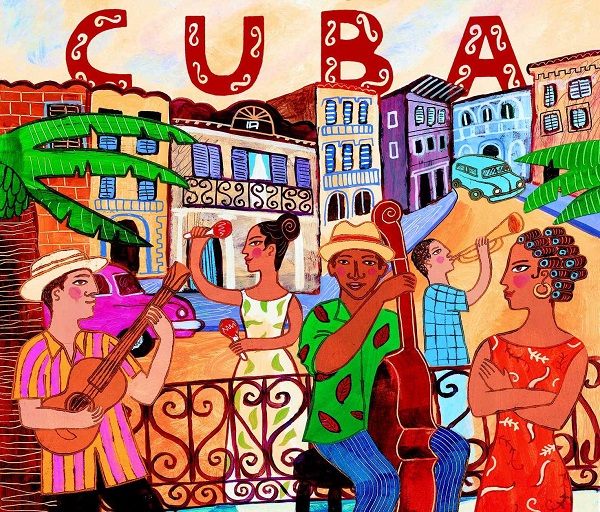11.7.2 Pablo Milanés Arias.

Pablo Milanés Arias is a Cuban composer, singer, and guitarist; born on February 24, 1943, in Bayamo, Granma province. He is essentially a self-taught Cuban musician, although he pursued some informal musical studies.
He began his professional artistic career with the Cuarteto del Rey from 1959 to 1963. Between 1964 and 1966 he worked with Los Bucaneros.
In 1964, he began working as a soloist among the followers of Feeling, a significant movement in Cuban song. He began composing a type of song rooted in the traditions of Trova and Feeling. His song “A mis veintedos años” (A mis veintedos años) is, for many, the clearest connection between this movement and Nueva Trova.
Years later, he joined the Center for Protest Song at the Casa de las Américas (3rd and G Streets, Vedado, Plaza de la Revolución, Havana). From its founding until his final performances, he also joined the GES (ICAIC Sound Experimentation Group). There, he pursued informal musical studies with maestros Leo Brouwer, Juan Elósegui, and Federico Smith.
The ICAIC Sound Experimentation Group was the initial nucleus of the Nueva Trova Movement, which they founded with other Cuban singer-songwriters in 1972 in the city of Manzanillo, during the First Meeting of the Association of Young Troubadours.
In the 1970s, he began to gain national and international popularity, touring extensively throughout the Americas and Europe. In 1982, with his group consisting of Emiliano Salvador (piano), Eduardo Ramos (bass), and Frank Bejerano (drums), he toured Mexico, in which Silvio Rodríguez also participated.
Pablo Milanés performed in Brazil in 1983; it was a major event, as no other Cuban musician had performed before the Brazilian public since Ignacio Villa (Bola de Nieve) in 1959. The Rio de Janeiro City Council awarded him the highest honor bestowed upon a foreign visitor. He subsequently performed in theaters in Rio and Sao Paulo. Later, with Silvio Rodríguez, he performed for the first time in Ecuador and Argentina.
In 1988, Pablo traveled to Spain with a new group, now comprised of Miguel Núñez (piano and keyboards); Orlando Sánchez (saxophone, clarinet, and keyboards); Eugenio Arango (Cuban percussion and batá drums); and the old members Eduardo Ramos (bass) and Frank Bejerano (drums). There, he performed, recorded, and sang with singer Tania Libertad. Upon returning to Cuba, he performed at the Karl Marx Theater and later traveled to Mexico, where he performed in several cities.
In 1989, he gave concerts in several municipalities of the capital, entitled Canción en el barrio (Song in the Neighborhood); he recorded Años III, with Luis Peña (El Albino) and Octavio Sánchez (Cotán), and he set out to “rescue” the most notable songs from Feeling for a younger audience, including pieces from his filipino period, under the label PM Records, belonging to the Pablo Milanés Foundation, founded in 1993.
In 1996, Milanés undertook another extensive tour of Spain, accompanied by Asturian singer Víctor Manuel, with whom he performed around twenty-five shows. In 1997, he traveled to Europe, Portugal, and Italy; and in Latin America, he visited Costa Rica, Venezuela, Colombia, and Chile. He also performed at the Lincoln Center in New York.
He was nominated for a Latin Grammy Award for Vengo naciendo, Best Pop Album 2000.
An important album in Pablo Milanés’ musical life was Querido Pablo, a tribute album recorded with some of his great friends, featuring internationally renowned musicians such as Víctor Manuel and Ana Belén, Luis Eduardo Aute, and Mercedes Sosa, among many others. This album had a sequel in 2001, titled Pablo Querido. Twenty years later, another group of great artists reunited to sing to the sound of Pablo Milanés. This time, they were joined by artists from the new world of pop music, such as Fher, the singer of Maná, Marco Antonio Muñiz, and Armando Manzanero.
In 2005 he composed part of the soundtrack for the film Siempre Habana directed by Ángel Peláez.
Pablo Milanés’ discography includes more than 30 albums. He has received numerous awards in South America, Europe, and other countries. He has recorded with artists such as Maná, Silvio Rodríguez, Joaquín Sabina, Ana Belén, Joan Manuel Serrat, Víctor Manuel, Los Van Van, Lilia Vera, Caco Senante, Ismael Serrano, and Luís Represas.
Pablo Milanés has contributed musical pieces for plays and documentaries, and has experimented with film scores. He possesses one of the most excellent and versatile voices in Cuban song of all time. As a composer, he has explored various genres of Cuban popular music. His lyrics feature phrases of great poetic sophistication, and his melodies demonstrate exceptional sensitivity.
Pablo Milanés has a vast and wide-ranging musical output. Among his most significant works are Acto de fe (Act of Faith), 1980; Ámame como soy (Love Me as I Am), 1985; Amo esta isla (Love This Island), 1975; Como una bendida (Like a Blessing), Cuando lejos estás (When You’re Far Away), and Yolanda (Yolanda), among many others.
Among the awards given to this great Cuban musician are: 1984. Order “Félix Varela”; 1982. Medal “Alejo Carpentier”; 2005. National Music Award; 2006. Medal “Haydee Santamaría” and in 2007. Medal “Haydeé Santamaría”.
Discography: Single Verses by José Martí [1973], Sing to Nicolás Guillén [1975], Life Is Worthless [1976], Don’t Ask Me [1977], The Warrior [1979], Anniversaries [1979], Filin 1 [1982], Act of Faith [1982], The Flower Preaching, with Lilia Vera [1983], Years 1, with Luis Peña [1983], I Live in Brazil [1984], Dear Pablo [1985], Beginning and End of a Green Morning [1985], Years 2, with Luis Peña and Cotán [1986], Good Morning America [1987], Troubadours, with Armando Garzón [1987], Propositions [1988], Filin 2 [1989], Filin 3 [1989], Identity [1990], Grandmother’s Song [1991], Filin 4) [1991], Filin 5 [1991], Evolution [1994], Origins [1994], Prayer [1995], In Black and White, with Víctor Manuel [1995], Awakening [1997], I Am Born [1998], Days of Glory [2000], Live from New York City [2000], Dear Pablo [2002], Like a Cornfield [2005], Parallel Lines, with Andy Montáñez [2005], Gift (2008), among others.








